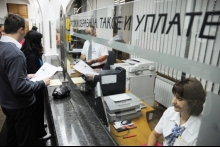
Nezavisne novine: The citizens of the RS will still remain in rows in front of the offices and desks of the republic and municipal institutions waiting for the birth, death and citizenship certificates and other documents to be issued because the electronic signature application has not started yet.
This has been confirmed by the fact that the Information Society Agency (ISA), whom the role of executing affairs of electronic certification for the republic government authorities has been entrusted to, starting from January 1st till today, has not received any request for signing the contract on the electronic signature introduction, which would enable ordering the documents over the internet.
"The reason probably lays in the fact that the individual information systems of government authorities, organizations and ministries are currently adapting themselves to the function which the electronic signature would have. On the basis of this, we expect the first contracts on executing these affairs to be signed soon", says Srđan Rajčević, director of the ISA.
He points out that only the Cabinet of the Chairman of the Government of the RS/the General Secretariat and several ministries have so far expressed the interest for electronic certification.
In the Administrative service of the City of Banja Luka they say that they are technically and professionally ready for the introduction of the qualified electronic signature, but this has not been done yet because they wait for this job to be finished by the ISA of the RS.
"Electronic signature will directly affect the quality of our service towards citizens in a positive sense. These changes would also significantly quicken and simplify some other segments of our business that are not in a direct connection with services which the Administrative service gives to its beneficiaries", says Ljiljana Vasojević-Radovanović, Head of the Informatics Department of the Administrative service.
The Ministry of Science and Technology of the RS has not signed a contract with the ISA of the RS either, which will be done once the information system of the Ministry/its software applications, become enabled for the electronic signature usage.
"That activity is currently being implemented, and in the next month we plan to request from the ISA for digital certificates. Electronic signature will make our work significantly easier. Firstly, we will try to eliminate a paper form in our internal and external communication, where possible", has been said in the Ministry of Science and Technology of the RS.
Aleksandar Radeta, Secretary of the Civil Administration Agency of the RS, says that the electronic signature will be firstly introduced in the affairs of the Cabinet of the Chairman of the RS, and later, once the conditions have been met, for other authorities and institutions.
Rajčević points out that there is not any formal obligation of government authorities to implement the electronic signature.
"The reason is of a practical nature – since the electronic signature is new in commercial and law business, especially in work of the administration, the Government of the RS has taken a standpoint that the electronic signature application remains facultative, and it should become introduced as an obligation after a certain positive practice and effects of its application", he has explained.
Željko Ninković from the Center of Civil Initiatives says that the main advantages of electronic signature are the cost reduction, time savings and rational resource spending. Therefore, its full application should be insisted as soon as possible.
"Bigger towns and municipalities should serve as an example in the electronic signature usage, and once the local administrations start using it, it will be much more efficient. It will make the everyday business activities of economists and citizens much easier", Ninković has concluded.
Verification of master data
In cooperation with the Agency for Identification Documents, Registers and Data Exchange of Bosnia and Herzegovina (IDDEEA), the Administrative service of the City of Banja Luka has started using the electronic signature for the part of affairs related to the master data verification.
Their internal system of electronic certification is allowed by the Law on Electronic Signature, except for the fact that they do not use a qualified electronic signature which unambiguously confirms a signatory. So far, only the ISA of the RS and BiH are issuing this type of certificate, because they have met all the conditions approved by the Law.
